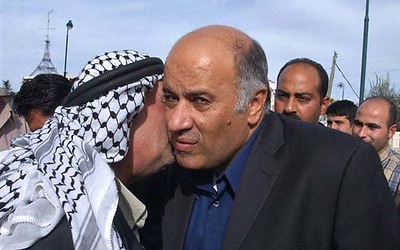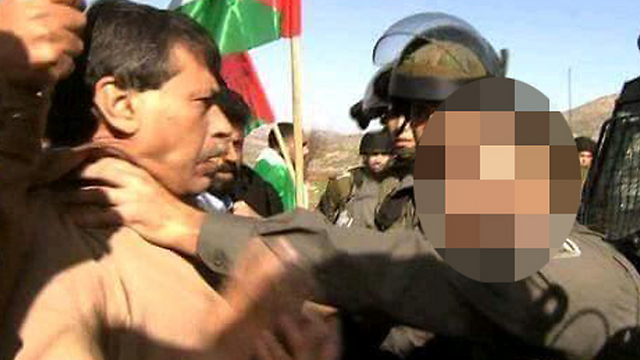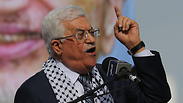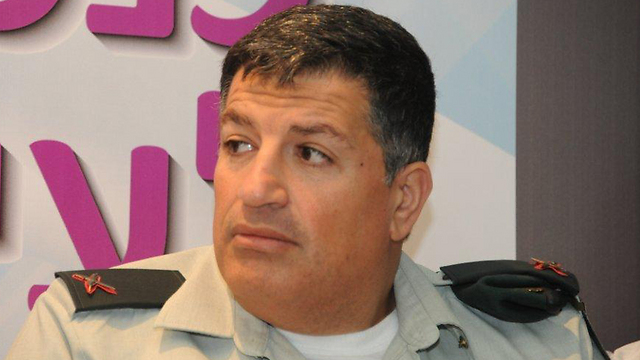All eyes on the Palestinian street
Analysis: Palestinian minister's death during West Bank demonstration was particularly bad timing for both sides; the Palestinians have been enjoying global momentum, and Israel was hoping that attacks and demonstrations had wound down. Now everyone is anxiously watching Palestinian street, the deciding factor in whether area is again engulfed in flames.
Beyond the personal tragedy, the story of the death of Palestinian minister Ziad Abu Ein highlights the tragedy of the Palestinian Authority's leaders. Their helplessness, destruction, their dependence on the world and the Israeli embrace. A mirror has been held in front of their faces and exposed them to their own wretchedness.
While two Jordanian pathologists carried out an autopsy on Abu Ein's body at the Forensic Institute in Abu Dis, under the watchful eye of Israeli doctors, members of the Fatah Central Committee gathered in Ramallah. They were upset and frustrated, knowing that they needed to do something in response to the incident, to let off steam.
The Palestinian narrative, which will not be confused by facts, tells that the deceased received a blow to the chest from the butt of a rifle of a Border Police officer. The senior members of Fatah's Central Committee have taken a very combative line, with Jibril Rajoub even going so far as to accuse Israel of murder. This is not just propaganda - it is a battle cry that is aimed at bringing the people out onto the streets.
But the hours passed, and the Palestinian Authority was left shocked and speechless before its public. Although it has other forms of protest up its sleeve, some of them will be derided by the Palestinian street and the others could backfire and pose an existential threat to the Authority.
Meanwhile, as an initial response to the mass funeral for Abu Ein and ensuing three days of mourning, the IDF has bolstered its forces in the West Bank with two army battalions and two Border Police units. Both the Palestinian Authority and Israel are praying that the final autopsy results in a declaration that the death of the minister had absolutely no direct link to dispersal of the demonstration, which incidentally was not particularly violent.

A post-mortem already has determined that Abu Ein died of complications from a heart attack, and, according to Dr. Chen Kugel, chief pathologist at Israel's Institute of Forensic Medicine, Israeli and Palestinian doctors are in no disagreement on this. But the road to a final determination is still a long one. An examination of tissue to determine whether there was a strike by a rifle butt is still a few days away, and the questioning of Border Guard officers on the ground is still ongoing. As time passes the area may calm, but no one could have fooled themselves into believing that Friday would pass quietly. The only question should have been as to what would ignite the situation once again.
String of successes
In the vacuum of the first hours after the incident, in which the PA found itself paralyzed, Israel embarked on a mighty effort to bring calm. This effort was not led by the political leadership, whose members fear that any gesture to the Palestinians will have direct impact on the number of seats gained by those to the right, but the Coordinator of Government Activities in the Territories, General Yoav Mordechai.
It was Mordechai who managed the marathon talks with the Palestinian leadership, expressed regret over the death of the minister, pledged transparency and tried to convince them not to let the situation deteriorate into violence. It's time to show leadership, he told them, and a loss of control will hurt us all. There was great anger on the other side, but no one slammed the phone down on him.
It seems that in the Israeli government, in the throes of electioneering, there is only one righteous man in Sodom. Defense Minister Moshe Ya'alon was the only one to publish an expression of regret over the death of a Palestinian minister. He took quite a risk, with the Likud primaries looming, but the price of violence may be far higher.
Meanwhile, Abu Ein's family helped calm matters with a call to avoid violence and aggression, claiming this was to be the legacy of the deceased.

The Palestinian public has long been critical of the Authority, which did not see fit to respond with aggression when young demonstrators were killed during clashes with the IDF. The knee jerk reaction was expected to have been severed security cooperation with Israel - where countries recall ambassadors, the PA stops answering the phone. But to date the only one to make disruptive declarations is Rajoub, who is not authorized to do so by anyone and whose statements are driven by his campaign to succeed Abbas.
The Palestinian leaders are reluctant to sever security ties with Israel because they know that such a step would ultimately lead to the West Bank being in similar situation to the Gaza Strip. The resistance forces, with Hamas in the vanguard, would raise their heads and put an end to the dream of an independent state.
If the Authority overlooks or even encourages violence that leads to bloodshed in the territories, it may lose its momentum toward a global embrace and mobilization of the international community to force Israel to answer questions about the future of the West Bank. It would be madness on its part to threaten its current string of successes: European parliaments are one by one recognizing the Palestinian state; there are also two draft resolutions – Jordanian and French - being presented to the Security Council, regarding the establishment of an independent Palestinian state; and even the US government is not vetoing them out of hand, for the first time in history.
And if that were not enough, EU bureaucrats have already prepared drafts for their politicians, including a number of recommendations how to press Israel through its pocket. For example, there are recommendations to boycott Israeli banks or financial institutions that have branches in West Bank, which could be a death blow for Israeli banking. And destroy all this for another demonstration or two? For the Palestinians, its power is in the restraint it is currently showing.
By its own rules
The Palestinian Authority does not hide its desire to participate in the elections in Israel, indirectly of course. It understands that any violence in the West Bank would only serve to strengthen the nationalist camp and harm the chances of any kind of future negotiations.
A plan to organize mass protests in major cities has been shelved for fear that the security forces would lose control of the crowds. Hamas hitched its wagon to the Temple Mount riots and was promoting unrest in Jerusalem, in an effort to send a message: If you do not accelerate the reconstruction of Gaza, you will pay the price when we set the West Bank aflame. To Hamas' frustration, the riots in Jerusalem died down, leaving it hankering for fresh unrest in the West Bank that would return it to center stage after a severe thrashing by the Shin Bet in the past year.
There is no doubt that the PA will leverage this event in the international arena, to show that the Netanyahu government did not stop on red, and continues to defy world public opinion. But the Palestinian public wants more than this; Israel has a sense that something is going to happen, and hopes that it will be just letting off steam and limited in duration.
For now, Israeli and Palestinian analysts are following events closely from behind closed doors. The interests are clear, the price is clear, but the street acts from the gut and follows its own rules.


















